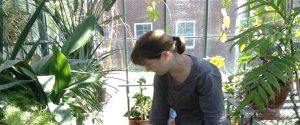We had many excellent proposals submitted for the fourth round of the “Teaching Tools in Plant Biology” competition, from which we selected five for further development. We’ve added another opportunity for you to submit your ideas for consideration as a Teaching Tools, deadline March 31, 2017 (see this for more information). Feel free to contact us at any time to discuss your ideas about creating a Teaching Tool.
A Bioinformatics Pipeline to Understand Transcriptional Regulation in Plants, by Amy Marshall-Colon and Ursulla Idleman
It is difficult to conceptualize genome-wide transcriptional regulation and even more challenging to organize, analyze, and visualize data at this scale. Network analysis of gene expression data is a popular way for plant scientists to deal with “-omic” scale data. However, the tools and techniques needed for such an analysis are not commonly taught alongside other plant biology curricula. As big data becomes standard in more plant research groups, students will benefit greatly from training, at both undergraduate and graduate levels, to perform meaningful analyses. In particular, construction of gene co-expression networks can provide students with diverse training in statistics, molecular biology, gene ontology, and basic graph theory.
Amy Marshall-Colon is an Assistant Professor in the Department of Plant Biology at the University of Illinois Urbana-Champaign. Dr. Marshall-Colon leads a research program at UIUC that uses plant systems biology approaches to integrate genomic and metabolomic information into network models to investigate regulatory crosstalk between primary and secondary metabolism. She teaches an undergraduate genetics course and a graduate level course in biological modeling. She also leads an internship program in collaboration with the local community college to provide two-year students with training in bioinformatics and systems biology.
After spending quite some time vacillating between research and teaching, Ursulla Idleman worked under Dr. Amy Marshall-Colon for two years as lab manager and technician. During this time, she grew interested in addressing issues of educational equity in plant biology and developing engaging broader impact and outreach opportunities. This fall, she started graduate school in UIUC’s Department of Curriculum & Instruction to focus on these challenges. Her research interests in plant biology include plant/insect interactions, conservation, and paleobotany.
Genetics of Floral Development, by Christine Fleet
 The genetics underlying floral development has been well established and provides an accessible introduction to developmental genetics for students. This Teaching Tool will focus on the modified ABC model by which homeotic genes specify floral structure. The Teaching Tool will include consideration of gene regulation via transcription factors and epigenetic mechanisms, as well as consideration of how variation in floral morphology occurs both within and across species. Students will acquire the ability to observe differences in floral morphology and predict how changes in floral gene expression may cause these changes in morphology, and give examples of how floral morphology impacts reproductive success.
The genetics underlying floral development has been well established and provides an accessible introduction to developmental genetics for students. This Teaching Tool will focus on the modified ABC model by which homeotic genes specify floral structure. The Teaching Tool will include consideration of gene regulation via transcription factors and epigenetic mechanisms, as well as consideration of how variation in floral morphology occurs both within and across species. Students will acquire the ability to observe differences in floral morphology and predict how changes in floral gene expression may cause these changes in morphology, and give examples of how floral morphology impacts reproductive success.
Christine M Fleet is an Associate Professor of Biology at Emory & Henry College in southwest Virginia. Her research interests focus on genetic regulation of plant development. She earned her Ph.D. from Duke University, working on transcriptional regulation of gibberellin production, and currently enjoys a variety of collaborations with undergraduate researchers. Christine previously co-authored the Teaching Tools in Plant Biology article on Gibberellins.
Herbicide Target Sites and Weed Resistance Mechanisms: Insights into Applied Plant Biochemistry, by Dean Riechers, Rong Ma, and Rex Liebl
Herbicides are organic chemicals that interact with specific protein target sites within plant biochemical pathways and disrupt physiological processes for growth and development. Inhibition of these enzymes, or in some cases over-stimulation of plant hormone responses (i.e. auxin), can lead to catastrophic effects that are lethal to certain plants. The complex interactions of herbicides with their respective target sites make them exceptionally useful tools to experimentally investigate, manipulate and better understand plant biochemical and physiological processes. Additionally, the intense selection pressures imparted by herbicides have led to the rapid development of herbicide-resistant weed populations worldwide via unique and diverse resistance mechanisms. Understanding how weeds have adapted to the selection pressures caused by herbicides and investigating these resistance mechanisms at the physiological, molecular, and genetic levels has greatly expanded our knowledge of plant biochemistry and primary metabolism.
Dean Riechers received his PhD in Crop Sciences at Washington State University in 1996, followed by a two-year postdoctoral position at the University of Virginia, and is currently Professor of Crop Sciences at the University of Illinois-Urbana. His research and teaching programs investigate plant responses to abiotic stresses, with the long-term goal of discovering new mechanisms to enhance abiotic stress tolerance in crops. His current research projects utilize grain sorghum (Sorghum bicolor) as a model grass and cereal crop to explore biochemical-defense and herbicide detoxification mechanisms in seedling coleoptile tissues, and tall waterhemp (Amaranthus tuberculatus) due to its perplexing and troublesome ability to adapt to current weed management strategies – particularly the rapid development of multiple herbicide-resistant populations.
Rong Ma is a Postdoctoral Research Associate in the Department of Crop Sciences at the University of Illinois-Urbana, where she had previously earned her PhD in Crop Sciences in 2014. One interesting but challenging aspect of her dissertation research was to investigate the detoxification mechanisms that confer resistance to two different herbicides, mesotrione and atrazine, in a population of tall waterhemp (Amaranthus tuberculatus) from Illinois, U.S.A. Her current research focuses on the molecular-genetic analysis of etiolated grain sorghum (Sorghum bicolor) coleoptiles following herbicide safener or oxylipin treatment, using a combination of biochemical, cytochemical, immunological, and molecular techniques.
Since completing his PhD at North Carolina State in 1985, Rex Liebl has worked in herbicide discovery, mode of action and technical development; first in academia and later in the agrochemical industry. Early in his career, he led biological screening efforts to identify and characterize new herbicide active ingredients. Rex is currently Global Product Development manager at BASF and is responsible for the advancement and commercial introduction of new herbicide active ingredients into the marketplace.
The Plant Cell Wall, by Jenny C. Mortimer and Igor Cesarino
This teaching tool will use the plant cell wall to unite aspects of plant physiology (cell wall function), metabolism (polysaccharide and lignin biosynthesis) and biotechnology (current and future uses for plant biomass). As a topic, it can be daunting for a non-specialist to teach, since it seems to require extensive complex biochemistry. This tool will demonstrate that only a brief introduction to cell wall structure and composition is needed in order to formulate and understand the core concepts. We will show that the cell wall is a dynamic and fascinating organelle that was crucial to plant evolutionary milestones e.g. the colonization of land, and is at the core of how the plant grows and interacts with its environment.
 Jenny Mortimer is a Scientist at Lawrence Berkeley National Laboratory in California, where she leads the Plant Systems Biology Group at the DOE-funded Joint BioEnergy Institute (JBEI). After completing graduate work with Julia Davies at Cambridge University, UK, she began studying the plant cell wall and lipid glycosylation as a postdoc with Paul Dupree and the BBSRC Bioenergy Centre (BSBEC), also at Cambridge. This was followed by a fellowship at RIKEN Yokohama, Japan, hosted by Taku Demura. Her group seeks to understand the control and function of glycosylation in the plant – specifically cell wall biosynthesis and sphingolipid glycosylation – and use this knowledge to improve the production of biofuels and bioproducts from plant biomass.
Jenny Mortimer is a Scientist at Lawrence Berkeley National Laboratory in California, where she leads the Plant Systems Biology Group at the DOE-funded Joint BioEnergy Institute (JBEI). After completing graduate work with Julia Davies at Cambridge University, UK, she began studying the plant cell wall and lipid glycosylation as a postdoc with Paul Dupree and the BBSRC Bioenergy Centre (BSBEC), also at Cambridge. This was followed by a fellowship at RIKEN Yokohama, Japan, hosted by Taku Demura. Her group seeks to understand the control and function of glycosylation in the plant – specifically cell wall biosynthesis and sphingolipid glycosylation – and use this knowledge to improve the production of biofuels and bioproducts from plant biomass.
Igor Cesarino is a Professor at the Department of Botany, University of São Paulo. During his PhD at the State University of Campinas, he worked on the characterization of peroxidases and laccases involved in sugarcane lignification, and used lignomics to provide the first in-depth characterization of the phenolic profile of sugarcane stems. This was followed by postdoctoral work with Wout Boerjan at VIB/University of Gent, Belgium, working on lignin metabolism and cell wall engineering for biofuel production. His current work focuses on the understanding of the molecular mechanisms underlying all aspects of lignin metabolism, including transcriptional regulation, biosynthesis and polymerization, with a major focus on grasses. The ultimate goal is to engineer lignin deposition in order to reduce plant biomass recalcitrance for downstream applications such as the production of biofuels and biomaterials.
Peptide Hormones in Plant Biology, by Wolf Scheible, Peter Lundquist, Michael Udvardi, and Sonali Roy
Plant hormones are endogenous signaling compounds that regulate plant growth and development. The so-called small signaling peptides (SSPs) have emerged as major regulators of diverse processes in plant biology. We will describe the characteristic sequences and describe the structural features of the SSP families and discuss their biosynthesis and transport. With this Teaching Tool lesson we will introduce students to the importance of SSPs in plants, guide students through the state-of-the-art, including current methods for studying SSPs, and discuss the relevance of these regulators in tackling agricultural challenges.
Wolf Scheible is a principal investigator in the Plant Biology Division of the Samuel Roberts Noble Foundation in Ardmore, Oklahoma, and was previously a group leader at the Max-Planck Institute for Molecular Plant Physiology in Potsdam, Germany. A focus of his research is to investigate how model plants respond to macronutrient limitation at the molecular level, and to apply the acquired knowledge to improve crop and forage plant species. Together with Michael and other colleagues he was recently awarded an NSF-PGRP grant to investigate small signalling peptides in Medicago truncatula, with an emphasis on macronutrient regulation of root and nodule development.
Peter Lundquist is a post-doctoral researcher at the Samuel Roberts Noble Foundation with Dr. Wolf Scheible. He completed his PhD at Cornell University, studying chloroplast biochemistry and proteomics, and was an Alexander von Humboldt post-doctoral fellow in Düsseldorf, Germany. His current research interests focus on identifying small signalling peptides in Medicago truncatula and understanding their relationship to macronutrient limitation and nodulation. He employs a wide array of complementary tools to address his questions, including transcriptomics, proteomics, and chemical genetics.
Michael Udvardi is Director of the Plant Biology Division at the Samuel Roberts Noble Foundation in Ardmore, Oklahoma, USA. He is primarily interested in how plants obtain nitrogen for growth, either as mineral nitrogen from the soil or from atmospheric di-nitrogen via symbiotic nitrogen fixation in bacteria. Specifically, he has contributed to our understanding of transport and metabolism in root nodules. Recently, his group has expanded its work on plant nitrogen to include associative nitrogen fixation, as well as nitrogen recycling during shoot senescence, in perennial plants. His group also has interests in plant acclimation and adaptation to abiotic stress, including drought and salinity.
Sonali Roy obtained her PhD. at the John Innes Centre in Norwich, UK investigating the role of the phytohormone auxin in symbiotic nitrogen fixation. She continues her research interests in signalling molecules during her post-doctoral appointment in Dr. Udvardi’s lab at the Samuel Roberts Noble Foundation where she examines the role of small signalling peptides in symbiotic interactions. In addition to investigative research, Sonali particularly enjoys mentoring and providing hands-on training to plant and molecular bioscience students.

Congratulations Dr. Riechers and team for the selection. Looking forward to read the article.
Hello plant science researchers,
I’m a PhD student from Algeria. I work about phytohormone auxine so I hope to contact Dr Sonali Roy for guide me and give me informations about the auxine as signaling the nutrients deficient in Plant nutrition.
So I would like to talk with her, if you want please send me her email address.
Thank you very much,
I hope you more of success.